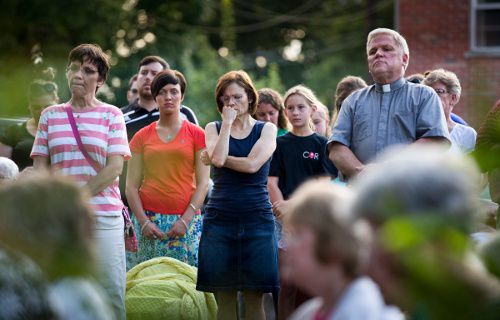Amid protests and heavy police action following the shooting of the teenaged Michael Brown in Ferguson, Mo., political and faith leaders have called for peace and just action from both civilians and police forces. “These scenes in the communities of Ferguson and Dellwood reflect the current state of our country and world,” wrote Fr. Art Cavitt, executive director of the St. Charles Lwanga Center in St. Louis and resident of Blessed Teresa of Calcutta Parish in Ferguson in an Aug. 14 column in the St. Louis Review. Previously, Blessed Teresa of Calcutta Parish had held a vigil night of prayer in honor of Brown and the protests surrounding his death. “These are wonderful times and these are horrible times,” Fr. Cavitt continued. “There is an abundance of wisdom and advancement in the quality of life, yet there is no shortage of foolishness.” On Aug. 9, 18-year-old Michael Brown was shot and killed in Ferguson, Mo., a suburb of St. Louis. The African-American teen was unarmed, and, according to eyewitness reports, was holding his hands in the air. On Aug. 15, Ferguson police announced that Brown is an alleged suspect in a convenience store robbery that occurred earlier on Aug. 9. Ferguson Police Chief Thomas Jackson later said that the officer who shot Brown did not know at the time of the confrontation that the teen was a suspect in the robbery. Neighbors began to protest the treatment of Brown’s body, which had been left uncovered after the shooting, by the police on Aug. 10, laying rose petals over the scene of the crime. Over the hours, vigils and protests grew, with some demonstrations turning violent or into opportunities for looting and arson. On August 11 and in the days following, protesters marching in the streets were met with police SWAT teams, who tried to stop the demonstrations using tear gas and rubber bullets, and confronting unarmed protesters. Protesters responded in some cases by trying to throw tear gas canisters and objects such as rocks back towards the police. Reporters covering the protesters have been arrested during coverage of the protests, as has a St. Louis alderman and nearly 20 community members for participation in “an unlawful demonstration.” Demonstrations around the country and on social media have criticized the Ferguson Police Department’s use of force, particularly against unarmed civilians, targeting of minority communities, and the militarized response to what started as peaceful demonstrations. Two lawsuits have been filed by the ACLU against the Ferguson Police over the controversy. On Aug. 14, Missouri Governor Jay Nixon announced that the Missouri Highway Patrol would take over security in Ferguson. U.S. Attorney General Eric Holder commented on the situation, saying that “while the vast majority of protests have been peaceful, acts of violence,” such as looting, “cannot be condoned.” He called these actions “unacceptable,” adding that they “do nothing to remember the young man who has died.” Holder also stated that the law enforcement ought to “seek to reduce tensions, not heighten them.” “Those who peacefully gather to express sympathy for the family of Michael Brown must have their rights respected at all times,” he stressed. The attorney general also added that local civic and religious leaders are working together “to plot out steps to reduce tensions in the community.” “I know that many Americans have been deeply disturbed by the images we’ve seen in the heartland of our country as police have clashed with people protesting,” President Barack Obama said, as he echoed Holder’s comments in an Aug. 14 statement, saying he had spoken earlier with the attorney general. Saying that Brown’s death occurred in “heartbreaking and tragic circumstances,” Obama warned against using the situation “as a cover for vandalism or looting,” and criticized the police for using “excessive force against peaceful protests” and violating First Amendment association rights. The president urged that “now’s the time for healing,” asking citizens to remember “that we’re all part of one American family.” “A basic respect for public order and the right to peaceful public protest,” the president stated. “A reverence for the dignity of every single man, woman and child among us and the need for accountability when it comes to our government.” Fr. Cavitt noted that historic racial tensions and “widening gap between haves and have-nots” also contribute to the situation, saying that systemic and interpersonal forms of racism form “violations of the human spirit.” Healing, he said “must include prayer for peace,” and lead to “ sound investing in our young people.” “We must inspire them,” Fr. Cavitt wrote, “to maintain and build their relationship with God for a greater sense of self and their role in this community and the larger world.” Archbishop Robert J. Carlson of St. Louis, who serves as chair of the Cabinet of Interfaith Partnership of Greater St. Louis, along with vice-chair Rev. C. Jessel Strong of the African Methodist Episcopal Church offered “compassion, prayers and support for the family of Michael Brown and the city of Ferguson, Missouri.” “We must examine the tragic events taking place in the St. Louis area, seek to understand “Why?” and work toward dismantling systemic racism,” the clergy wrote. “Until the causes are addressed and rectified, there will be no change,” they said, asking for prayers “calm and peace and to be part of healing” as the community works toward solutions.

